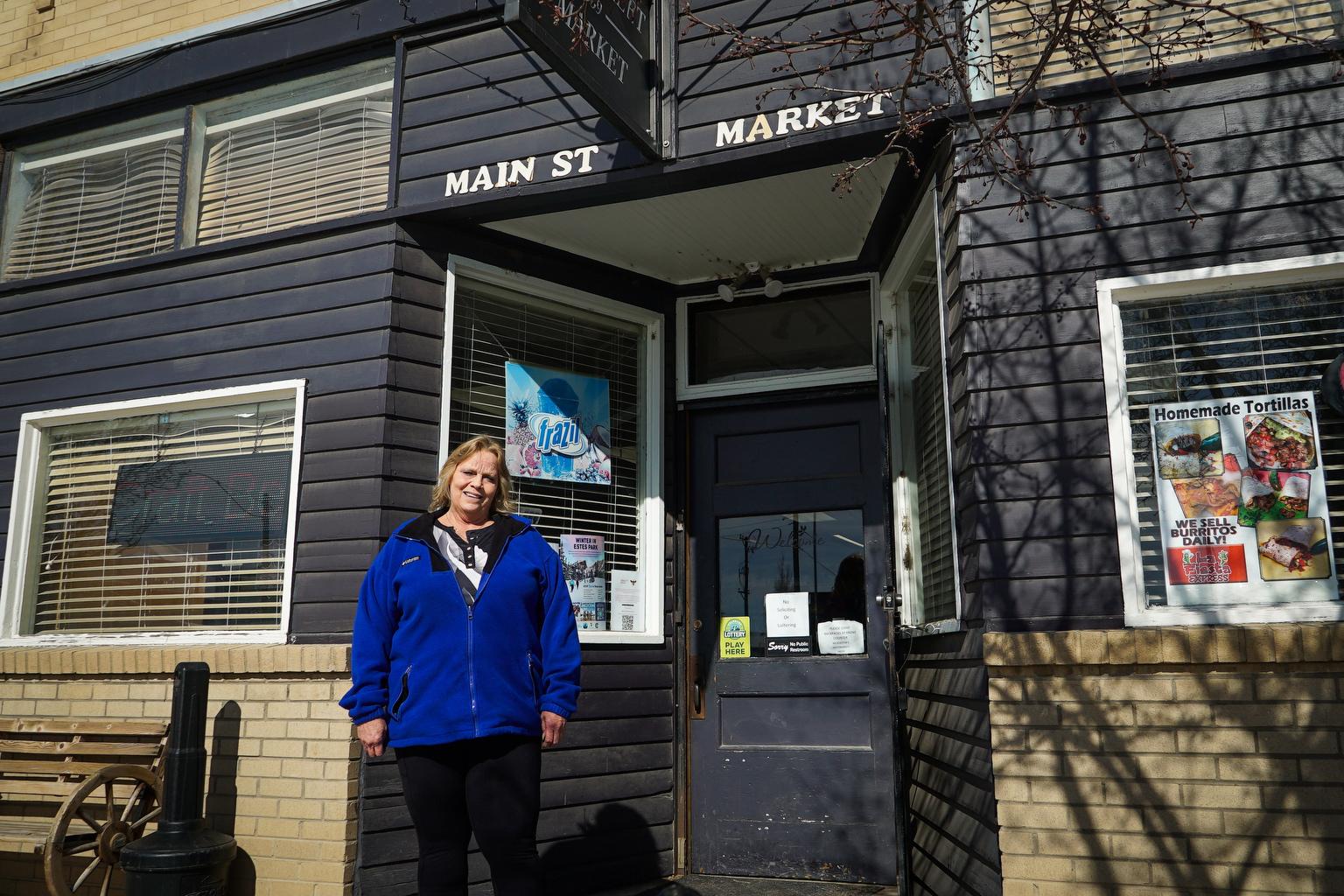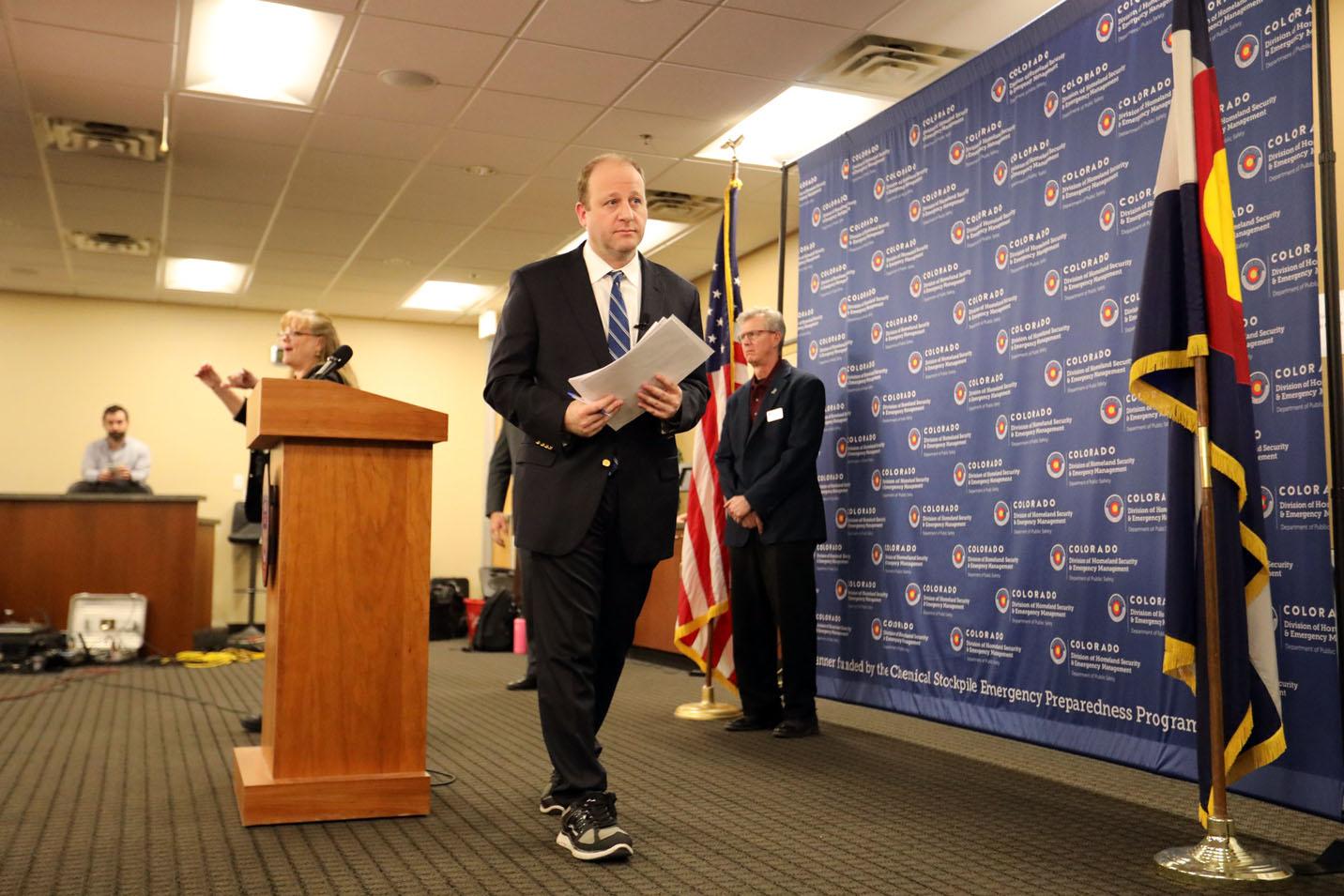
This post collects all of our updates and reporting from March 25, 2020, on the coronavirus pandemic in Colorado. You can find Thursday's latest right here. Our original play-by-play of reporting continues below.
8:52 p.m. — Goodnight live blog
Here are some stories not about coronavirus:
- Colorado Wants Craft Breweries To Capture The CO2 Their Brews Burp Out, And Make Some Cash From It
- RTD Buses And Trains Will Move To Full Time Weekend Service Levels In April
- The FAA’s New Flight Paths Around The Denver Metro Kick In Thursday, But Not Without Criticism
Tomorrow's another day, with more to see and more squirrels to catch. See you then.
8:28 p.m. — ICYMI Polis' stay at some announcement...
Your smartphone's got you.
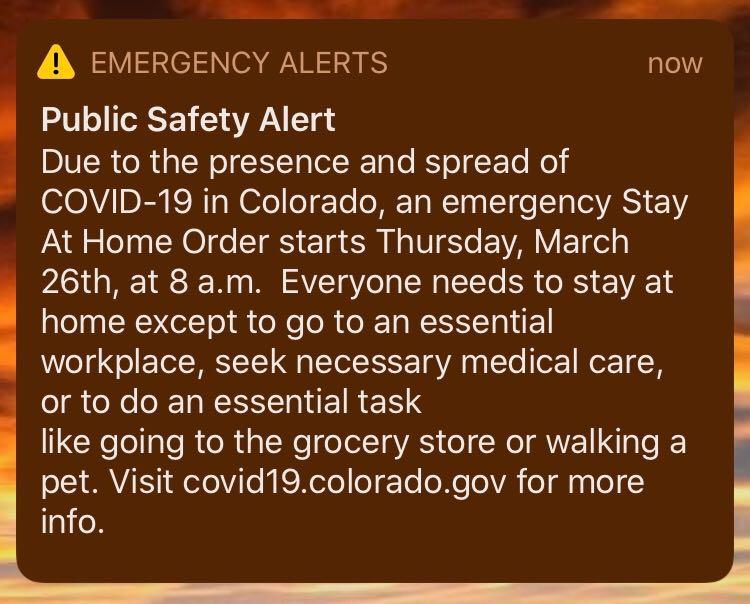
7:07 p.m. — As grocery stores remain open during a stay-at-home order, a continued push to better protect their workers
Clergy, union presidents and nonprofit directors met with Gov. Jared Polis this week to urge his support in protecting grocery store workers.
Coloradans for the Common Good asked Polis to designate those workers as first responders in the COVID-19 health emergency.
“A healthy and strong foodservice workforce — at the store, the warehouse, the food processing centers — is critical to our getting through this crisis together,” said Marilyn Winokur, chair of Coloradans for the Common Good and member of B’nai Havurah, a Denver Jewish Reconstructionist Congregation, said in a release.
Polis issued a letter to the parent companies of King Soopers and Safeway stores, supporting the groups’ positions. Polis also assured union leaders that food workers were considered essential workers and qualified for priority childcare, including up to two weeks free childcare, and other protections afforded to first responders during this crisis.
In the stay-at-home order issued by Polis on Wednesday, grocery store and food processing employees were listed as essential workers.
— Alison Borden
6:58 p.m. — So wait, what can I do and what can I not do under this order?
We're breaking down the particulars of the governor's statewide order here. You can also peruse the stay at home order in full below.
— Alex Scoville
6:41 p.m. — Vape shops aren't too happy that they're not classified as essential services
Colorado vape shops are condemning new coronavirus stay at home orders from the state of Colorado on Wednesday, which followed one from Denver on Tuesday.
The orders from the state and the city of Denver ordered some businesses to close in order to limit people congregating and spreading coronavirus. But both allowed some to stay open if they were designated “critical" — including liquor stores and dispensaries.
A trade group complained that vape shops should be treated like pot dispensaries and liquor stores.
“If alcohol and recreational marijuana are essential services, we believe that responsible adult vaping consumption is an essential service too,” said Amanda Wheeler, vice president of the Rocky Mountain Smoke Free Alliance, in a statement.
Wheeler describes it as a health issue. She says many vape shop customers are former combustible cigarette smokers looking for a healthier alternative to smoking. If vape shops stay closed, former smokers may end up buying cigarettes from convenience stores, Wheeler said.
E-cigarettes aren't approved by the FDA as a quit aid. Research about whether e-cigarettes can help people stop using tobacco have had inconsistent results, according to the Mayo Clinic.
— John Daley
5:24 p.m. — Mesa Verde National Park to close
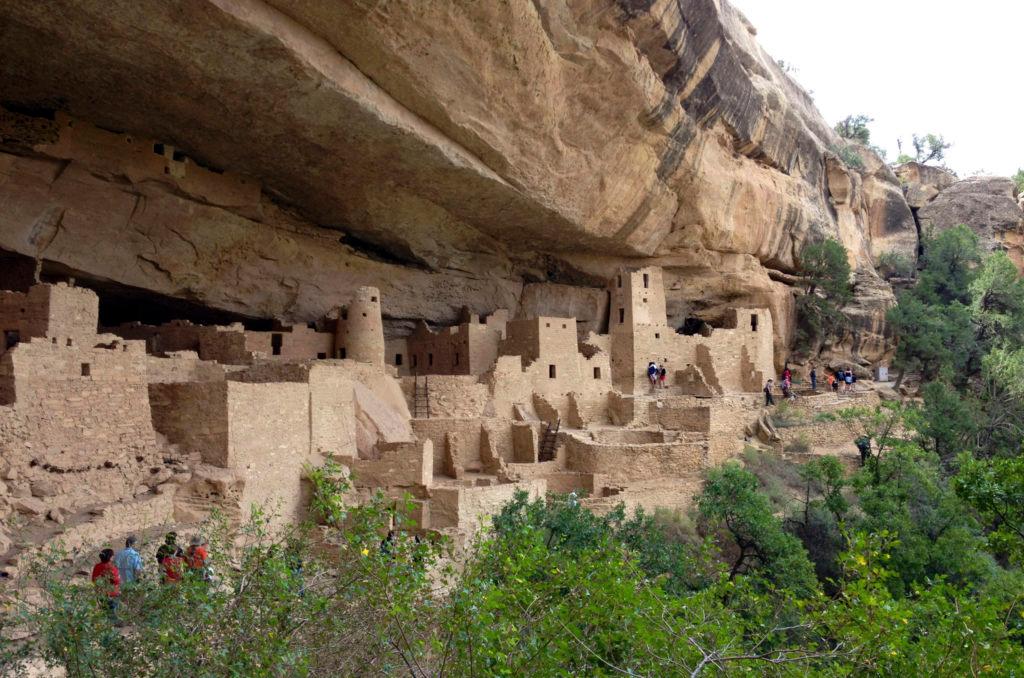
Another Colorado National Park is closing its gates to stop the spread of the new coronavirus.
Mesa Verde National Park in Cortez, known for its well-preserved cliff dwellings made by the Ancestral Pueblo people, will close to all park visitors at the end of the day Wednesday. The park did not have an estimated date for re-opening.
— Alex Scoville
4:39 p.m. — Polis announces a statewide stay at home order
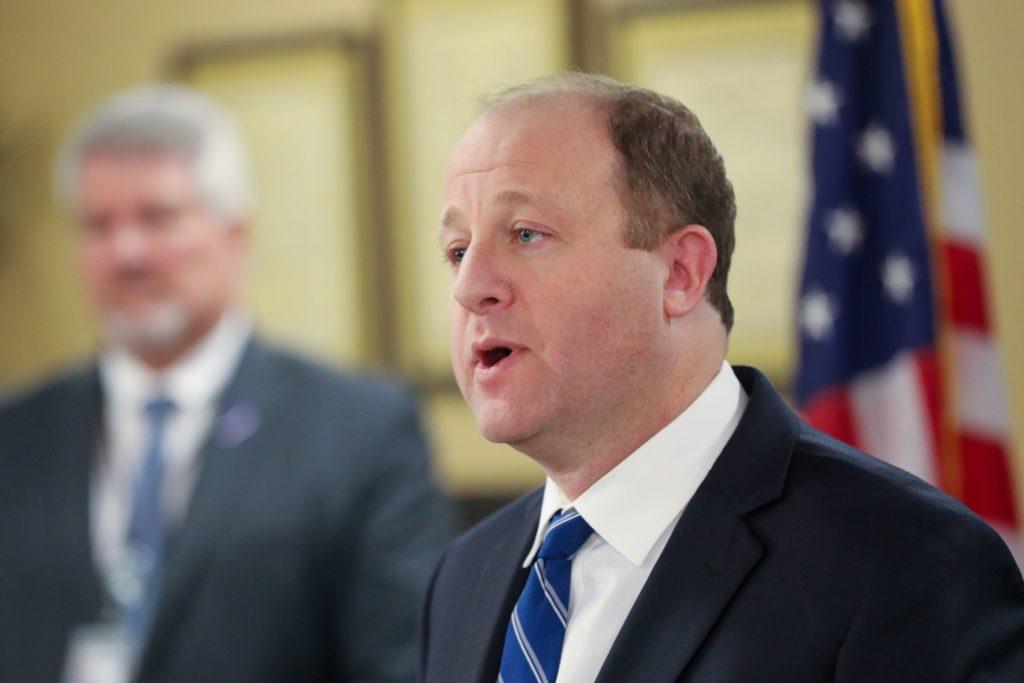
Gov. Jared Polis issued a statewide “stay at home” order Wednesday, requiring the state’s 5.7 million residents to avoid unnecessary travel and mingling with others outside their households.
“Now is the time to stay at home,” Polis said.
4:18 p.m. — There are more than 1,000 cases of COVID-19 in Colorado
State health officials reported 1,086 confirmed cases of COVID-19 in Colorado, an increase of 174 from the day before.
There have been 19 deaths due to COVID-19 in Colorado.
There are now 148 hospitalized cases, an increase of 64 from the previous report.
Colorado tested 363 people in the last day.
— Alex Scoville
3:52 p.m. — Gov. Polis will provide updates around 4 p.m.
We are currently awaiting Gov. Jared Polis, who is scheduled to speak at 4 p.m. MDT with updates on Colorado's coronavirus response.
Listen to the governor's remarks by clicking Listen Live above, over the air or one of these other streaming options.
— Dan Schneider
2:55 p.m. — Grand Junction is going halfsies on city employees' lunches
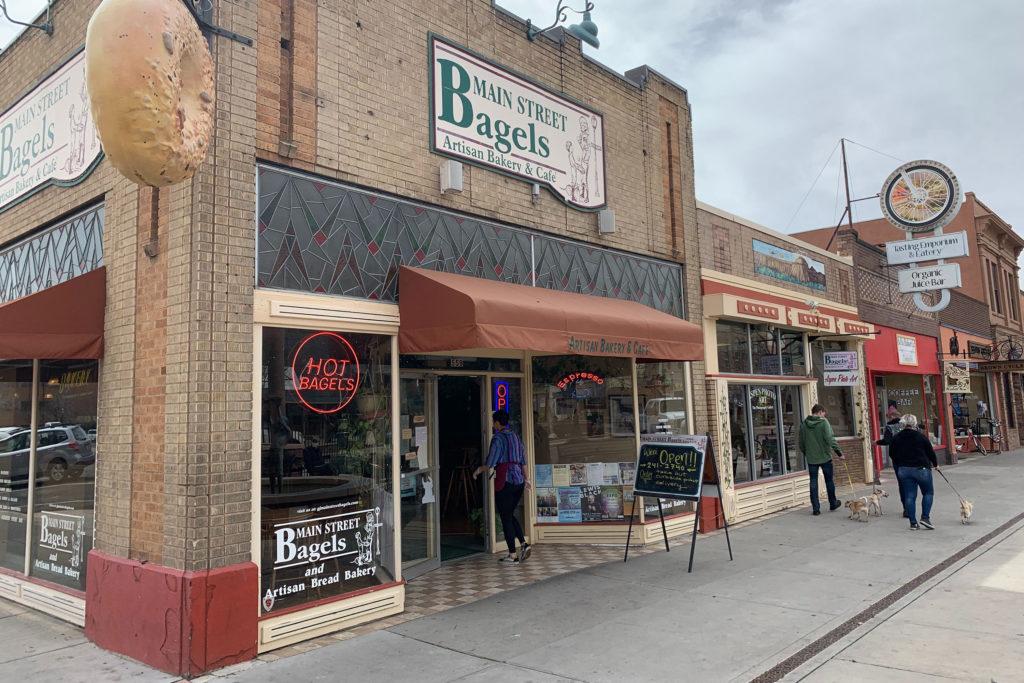
As restaurants continue to struggle during the COVID-19 pandemic, the City of Grand Junction is hoping to help eateries by encouraging city employees to frequent local restaurants — and paying half the tab.
Between now and April 10, the city government will reimburse 50 percent of each restaurant bill from its employees, as long as they order from a spot within city limits. There’s a cap of $300, meaning $150 of reimbursement. Employees are asked to save their receipts and turn them in at the end of the program’s period.
If all approximately 640 employees take full advantage of the offer, Grand Junction’s restaurants would be infused with nearly $200,000. The city is encouraging employees to share their foodie forays on social media with the hashtag #GJStrongAppetite.
Colorado Mesa University has started a similar reimbursement program for its faculty and staff.
Restaurants in Grand Junction, and across the country, have been forced to adapt on the fly, as dine-in service has been suspended. Though several have temporarily closed, many are still open, trying to entice customers with free delivery and to-go booze (after Gov. Jared Polis relaxed alcohol regulations). Some eateries have even become miniature general stores of sorts, selling staples like eggs, toilet paper and flour, alongside their regular menu.
— Stina Sieg
2:37 p.m. — Mikaela Shiffrin is auctioning off old gear for a good cause

The Olympic gold medalist and Vail native is one of three Team USA athletes auctioning off gear and other goodies to benefit charities during the COVID-19 outbreak.
Money raised from Shiffrin's items will go to the Food Bank of the Rockies and the Colorado COVID Relief Fund.
Offerings include her U.S. Ski Team jacket and pants and some very cozy-looking beanies. The auction goes on for another 11 days, but the current bid on her jacket already stands at $2,600.
— Alex Scoville
2:26 p.m. — Literally just a bunch of animal news ???
As humans hunker down, the animals come out to play.
Or, at least, a bunch of mountain lions in Boulder did.
Wildlife experts told The Daily Camera that this is generally the time of year mountain lions show up in town. They won't know for a while if or how quarantine efforts will change animal behavior, but it's possible.
Meanwhile, Colorado Parks and Wildlife are calling off their annual walleye spawn in Lake Pueblo and the Chatfield and Cherry Creek reservoirs.
Walleye have been stocked in Colorado’s waters since around 1949. Wildlife officials aren't too worried that the one-year break will negatively affect the fishy population.
“Our walleye populations in our recreation waters across the state are strong,” CPW aquatic section manager Matt Nicholl said in a statement. “Stocking is just one tool that fish managers use. Missing a year-class stocked into these waters is not going to crash our walleye populations.”
And ICYMI, the Denver Zoo gave a virtual tour of their giraffe exhibit yesterday.
— Alex Scoville
2:09 p.m. — Dougco lawmakers push back against shelter in place order
The two state senators and four state representatives that represent Douglas County are demanding that the county commissioners sever ties with Tri-County Health Department after those health officials issued a shelter in place order on Wednesday for the region.
The letter was signed by state Sens. Chris Holbert and Jim Smallwood and state Reps. Patrick Neville, Kevin Van Winkle, Kim Ransom and Mark Baisley.
Tri-County Health represents Douglas, Adams and Arapahoe counties.
"It is our understanding that at least two of you (commissioners) opposed this heavy-handed application of government power," the letter reads. "We consider it unacceptable that a contracted health agency could somehow ignore the will of a majority of our elected officials and accountable Douglas County Commissioners."
The Tri-County Health shelter in place order goes into effect at 8 a.m. on Thursday, March 26, and will expire on April 18 if it is not extended by health officials.
— Alex Scoville
12:26 p.m. — Meanwhile, in Grand Junction...
12:12 p.m. — Gardner out of quarantine and back on the Senate floor
After being in self-quarantine for more than a week, Sen. Cory Gardner is out and he took to the Senate floor to urge his colleagues to vote on the Phase 3 coronavirus relief package.
“Pass the doggone bill,” Gardner said. “The American people have been expecting this for a long time. It shouldn't have taken this long. Do your job. Do our job. Get this done.”
The Senate is expected to pass the $2 trillion dollar bill sometime today. There were five days of negotiations involving Republicans, Democrats and the White House.

Gardner said he spoke with Gov. Jared Polis about how to continue to provide the resources that the state needs. But he also highlighted the good that colorado communities and businesses were doing in the face of this public health crisis.
“Coloradans have stepped up in every way possible,” Gardner said, pointing to hemp businesses producing cotton swabs, whiskey distilleries making hand sanitizers and the donation of medical equipment. “The American people are rising above the fray.”
But Gardner also said all these relief packages passed by Congress are just the start to deal with the “tremendous needs” currently facing the country.
“We didn’t run through the tape. We haven't finished the job,” he said. Instead, Gardner said we’re at the starting line.
Bennet spoke on the floor earlier this week about the need for medical supplies.
— Caitlyn Kim
11:45 a.m. — Guidance for the justice system in these weird times
10:26 a.m. — Broomfield will require social distancing, only encourage residents to stay home
Unlike a few other Denver metro counties, the City and County of Broomfield will only encourage residents to stay home as necessary in a new public health order that takes effect tomorrow at 8 a.m.
Broomfield will require proper social distancing between residents and encourage residents to "stay home for all but essential activities." In a statement announcing the order, officials warn they are "prepared to act swiftly to implement a more stringent Shelter in Place Order that will impact all residents and businesses in Broomfield, if necessary."
Broomfield said they would have a team of employees, in identifiable vests and official vehicles, to encourage compliance throughout the city and county between 10 a.m. and 6 p.m. Playgrounds and some park areas will be closed to slow the spread of COVID-19.
Open (w/ social distancing)
- City and County Open Space
- 308 Miles of Trails, Bike Lanes and 8-foot sidewalks
- City and County Parks without shared equipment
- Take-out at local restaurants
- Dog Parks
Closed
- Playgrounds
- Pickleball Courts
- Tennis Courts
- Pavilions
- Bike Parks
- Frisbee Golf Courses
- Athletic Fields
— Jim Hill
10:00 a.m. — More stay-at-home orders: Boulder County Public Health, Jefferson County Public Health and Tri-County Health Department
The order, effective at 8:00 a.m. on March 26, requires individuals to stay at home and away from others. Essential activities, such as shopping for groceries or medications, and outdoor activities like walking, hiking or running (provided social distancing is observed) are allowed.
"This is not driven by Swiss watch mathematical precision, however, it is driven by daily drumbeats of increases in the epidemic and projections that we're probably literally weeks away from a situation where hospital capacity gets exceeded," said Dr. John Douglas of Tri-County Health.
Here are a few examples provided by the departments in a release:
Permitted
- Getting medical care for you, a family member or your pet
- Visiting a health care professional
- Getting medical supplies or medication
- Going to get groceries, food (via takeout, drive-thru, food banks/pantries) or other essential household items
- Getting supplies to work from home
- Picking up materials from your child’s school needed for distance learning (tablet, books)
- Going outside for physical activity, as long as you stay at least 6 feet away from people who are not in your household and follow social distancing practices
- Going to work, ONLY if you provide essential products or services at an essential business (health care operations, infrastructure operations and maintenance, certain government functions)
Not Permitted
- In-person public or private gatherings of any size with people outside of your residence
- Traveling, except to get or provide essential services or medical care
- Carpooling with anyone outside of your residence
All combined, the three health departments serve more than 2 million residents across the metro in Boulder, Jefferson, Adams, Arapahoe and Douglas counties.
La orden, vigente desde las 8 a.m. del 26 de marzo, requiere que las personas se queden en casa y lejos de los demás. Se permiten actividades esenciales como comprar comestibles o medicamentos, y actividades al aire libre como caminar, hiking o trotar (siempre y cuando que se mantenga el distanciamiento social).
"Esto no está impulsado por la precisión matemática de los relojes suizos, sin embargo, está impulsado por el ritmo diario de aumentos en la epidemia y las proyecciones de que probablemente estamos literalmente a semanas de una situación en la que se exceda la capacidad de los hospitales", dijo el Dr. John Douglas, del Tri-County Health.
Aquí hay algunos ejemplos compartidos por los departamentos en un comunicado:
Se permite:
- Obtener atención médica para usted, un miembro de su familia o su mascota.
- Visitar a un profesional de la salud.
- Obtener medicamentos o suministros médicos.
- Ir a comprar víveres, comida (a través de comida para llevar, autoservicio, bancos y despensas de comida) u otros artículos esenciales para el hogar.
- Buscar materiales para trabajar desde casa.
- Recoger materiales escolares necesarios para tu hijo y su aprendizaje a distancia (tableta, libros).
- Salir al aire libre para realizar actividades físicas, siempre y cuando se mantenga al menos a 6 pies de distancia de las personas que no están en su hogar y siga las prácticas del distanciamiento social.
- Ir a trabajar, SOLO si ofreces productos o servicios indispensables (como operaciones de atención médica, infraestructura y mantenimiento y ciertas funciones gubernamentales).
No está permitido:
- Reuniones públicas ni privadas de cualquier tamaño fuera de tu residencia.
- Viajar, excepto para obtener o proveer servicios esenciales o médicos.
- Viajar en auto con alguien que no viva en tu residencia.
Juntos, los tres departamentos de salud atienden a más de 2 millones de personas en los condados de Boulder, Jefferson, Adams, Arapahoe y Douglas.
— Jim Hill
9:39 a.m. — What does it means to “stay at home” when you don’t have a home?
The mayor's stay-home order in the City and County of Denver exempts people experiencing homelessness, but urges them to obtain shelter.
“Are they creating more resources?” asked Davon Moss outside of the Denver Rescue Mission and Samaritan House on Tuesday. “And this stay-at home — if an individual doesn’t have a home, where do they stay?”
The coronavirus outbreak has underscored the shortcomings of Denver’s shelter system.
City outreach workers have been distributing to people experiencing homelessness hand sanitizer, bottled water, snacks, vitamin C supplements, COVID-19 information cards and maps of public restrooms and hand-washing stations.
— Donna Bryson
8:14 a.m. — Fort Carson declares public health emergency
Following in the steps of several of Colorado Springs' Air Force facilities, Fort Carson has issued a public health emergency due to the COVID19 outbreak.
The base said the declaration, which is in effect for 30 days, allows the installation commander to take protective measures like the restriction of movement and limiting services to mitigate the spread of coronavirus. The Gazette reports there are currently four cases connected to Fort Carson.
In the meantime, more than 300 medical personnel from the base's 627th Hospital expeditionary unit are headed to Washington state to help with coronavirus relief efforts there.
— Natalia Navarro
7:52 a.m. — National Parks start to shutter to limit the spread
Three of America's best-known national parks — Yellowstone, Grand Teton and the Great Smoky Mountains — closed their gates Tuesday as parks struggle to keep popular recreation areas open while hoping to prevent the spread of coronavirus at congested sites.
They join a growing list of national parks that have closed from New York to California, including the Statue of Liberty and Alcatraz. Rocky Mountain National Park closed on March 20 and Yosemite National Park in California has also closed. Other parks that remain open have closed shuttles, campgrounds, visitor centers and some trails to prevent the spread of COVID-19.
— Associated Press
7:35 a.m. — When will state lawmakers get back to work? That's up to the state supreme court
The Colorado Supreme Court is expected to weigh in soon on the question of how long state lawmakers will have to resume their work when they do eventually return to the state Capitol.
The central question is when the legislative session must end. Under normal circumstances, it would be after 120 days after it opens, which would have been May 6. But state lawmakers took the unprecedented step to suspend the session for at least two weeks because of the coronavirus pandemic.
Democrats argue Colorado’s current state of emergency triggers a rule that lets the session go past the normal end date. That means the pause in work would not reduce the overall number of legislative workdays. Republicans say the state's constitution is firm and the original end date must stay in place. The GOP argues that if lawmakers need more time to pass bills, Gov. Jared Polis could call a special legislative session.
— Bente Birkeland
6:53 a.m. — Colorado saw another surge of cases last night
Ther are now 912 known positive cases of coronavirus in Colorado. Eighty-four are hospitalized across 35 counties and 7,701 people have been tested.
There have been 11 deaths as a result of COVID-19.
Frontline hospital workers say the state is at a pivotal time for addressing the outbreak and that they've seen a surge in patients. Some hospitals report that the numbers of patients have doubled by the day. Dr. Richard Zane, chair of the Department of Emergency Medicine at the University of Colorado School of Medicine, said it's now crunch time.
"There's no way to describe it," he said. "These next two weeks are going to define how bad the next 18 months are."
Zane pointed out that it is urgent that people stay at home and avoid physical contact with others to help blunt the spread of the virus.
Ahora hay 912 casos positivos de coronavirus en Colorado. En total, 84 están hospitalizados en 35 condados y se han examinado a 7.701 personas.
Han habido 11 muertes como resultado del COVID-19.
Personal de hospitales dicen que el estado está en un momento clave para dirigirse sobre el brote y que han visto un aumento de pacientes. Algunos hospitales reportan que el número de pacientes se ha duplicado diariamente. El Dr. Richard Zane, de la Escuela de Medicina de la Universidad de Colorado, dijo que es la hora de la verdad.
"No hay manera de describirlo," dijo. "Las próximas dos semanas definirán cuán mal serán los próximos 18 meses."
Zane sostuvo que es urgente que la gente se quede en casa y evite contacto físico con otros para ayudar a frenar la propagación del virus.
— John Daley, Jim Hill






